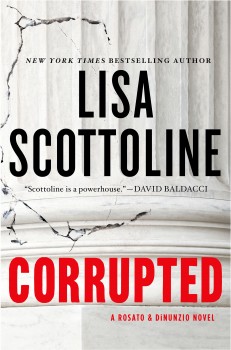Corrupted by Lisa Scottoline
When High-Octane Thriller Meets Family Drama
Pick up any major newspaper, anywhere in the country, and you’ll find gross miscarriages of justice. Those stories are what drive New York Times bestselling author Lisa Scottoline, who believes that the law should work for everyone, not just a few, that sometimes criminals go free and the innocent get put away, and the rules are constantly evolving. And that’s what drives her Rosato & DiNunzio series, featuring an all-female law firm. Fans won’t be disappointed with the latest book in the series, CORRUPTED. It’s filled with suspense, intrigue, and courtroom drama, along with a good dose of the wit and humor that’s a Scottoline hallmark. The lawyer-turned-author has sold 30 million books in 35 countries by shining the light on injustice, at the same time capturing the hearts and minds of readers with sympathetic, believable characters.
In CORRUPTED, attorney Bennie Rosato is taking on a case that brings her back to a painful event in her life. Thirteen years ago she represented Jason Leftavick, a twelve-year-old boy who was sent to a juvenile detention center after fighting a class bully. Bennie couldn’t free Jason, and to this day it’s the case that haunts her. Today, Bennie only rarely represents those accused of murder, but when Jason is indicted for killing the same bully he fought with as a kid, she sees no choice but to take on the case as his attorney. She doesn’t know whether or not to believe his claims of innocence, but she knows she owes him for past failures–of the law, of the juvenile justice system, and of herself.
Scottoline’s books have landed on every major bestseller list. She’s received an Edgar Award, the Fun, Fearless, Fiction Award by Cosmopolitan magazine and was named a PW Innovator by Publisher’s Weekly. She has taught a course she developed, “Justice and Fiction” at The University of Pennsylvania Law School, and also writes a weekly column with her daughter Francesca Serritella for the Philadelphia Inquirer titled “Chick Wit,” which is a witty and fun take on life from a woman’s perspective.
Lisa took time from her hectic schedule to share her thoughts on her latest book, tips on writing and how flaws in our legal system inspired so many of her novels.
I think the most successful authors write with passion, about subjects they care about. You have said your books focus on the intersection of justice and law and that sometimes law is disconnected from justice, or even thwarts it. Was there a particular case that led you to integrate this idea into your books?
This is an incredible question because I have actually never thought about this until now, but I think there is one case that is really illustrative of the disconnect between law and justice, especially in its historical context, and that’s Miranda v. Arizona, which as you know, is the case that established the requirement for Miranda warnings. Briefly, the facts of the case were that Ernesto Miranda confessed to rape and kidnapping but wasn’t warned of his right to counsel, and so he was set free. The case took place in the 1966, and even though I was 11 years old at the time, I remember my parents talking about it, and the neighbors, and I was a reader of newspapers, even back then. I didn’t understand much about the hullabaloo, but I got the gist that a bad guy went free for some “technicality,” and as I became an adult, I got interested in what justice meant from that case, and when I became a lawyer I came to understand that what we often dismiss as a technicality is what protects our bedrock individual freedoms–in other words, the legal procedure that safeguards an array of substantive rights. So Miranda becomes a perfect illustration of when law and justice collide, or when law even thwarts justice. Now that I think about it, I truly believe that that case led me to become not only a lawyer but a fan of books written about justice for all of my reading life, so much so that I ended up teaching a course at the University of Pennsylvania Law School, my alma mater, titled “Justice and Fiction.” So bravo for asking the question, in which I learned something about myself!
CORRUPTED is based on a real-life scandal involving children being jailed for the sake of money. I can’t imagine a more heart-wrenching situation for a defense attorney, and for Bennie, the case is a haunting part of her past. The book almost feels like two stories, fatally tied: Bennie representing Jason as a child and then as an adult. How do you think she changes over the years, as a lawyer and a woman?
I really love the way you put that, in that these storylines are fatally tied! I think this question goes right to the heart of the book, so much so that I might decline to give a detailed answer. I really want the readers to see the way Bennie changes for themselves. I think the important point to be made about the novel is that it represents the temptation and the pitfalls of a second chance. We always think we want a second chance and we would do something differently, and Bennie has lived her whole life with that illusion, which is the flipside of regret. When confronted with the second chance, what would she do with it? When Jason is confronted with the second chance, what does he do with it? And the same is true of Declan, the love of her life, what does he do with it? All of these decisions illustrate character, because I always think that action is the best way to show character, as in life.
In your courtroom scenes, the dialogue and legal banter is so snappy, compelling and spot-on. Are you recalling real-life experiences when writing scenes like these or is it straight from imagination?
Thank you for saying that, and I spent my fair share of time in courtrooms, not only as a young associate but also observing since I was too young and inexperienced to try the big cases. What always struck me then, and does now, is that the best communicators in a courtroom simply talk normally, even if they’re talking to a judge or jury. When I stood up in court, I always said to myself, Just talk to the people, and it was my secret little mantra to calm myself down. That said, I do think that lawyers are smart people and to broaden it out, I love to write about smart people and smart people have a way with words. They love banter, wordplay, and getting to the point. Lawyers especially have to distill the point, and that’s why in CORRUPTED I make a point of showing that in the appellate argument, there’s a time limit. There are podiums with red and green and yellow lights. You can only talk for specific amount of time, so you have to get to the point. I put that in specifically because I want people to understand that the legal procedure is correct and frankly, demanding. It’s not like in television, where you get to talk endlessly and out of turn. I like to play by the rules in my books, and I think I’ve a special responsibility to do that as a trial lawyer. And it’s harder to win when you play by the rules than when you don’t, but the fun is in the challenge.
This book focuses on juvenile law, which you reveal is quite different from the adult legal system. Is this an area familiar to you, or did it require a lot of research?
I was not familiar with juvenile law, but I always wanted to learn more about it, and then I realized that it was an area that I could educate people about, albeit in an intimate entertaining way, in a thriller. I think more and more we are focusing on juvenile law and its distinct thorny questions, like whether young people should be incarcerated for life, which is a current case that was argued in front of the United States Supreme Court two days ago. The interesting thing about law is that it evolves, and so does justice, and it keeps pace with our current understanding of people, as well as social and political norms. That’s the stuff that forms the backdrop of CORRUPTED and the whole of the Rosato & DiNunzio series.
When writing about books in the Rosato & DiNunzio series, reviewers often mention that it’s an “all-female law firm” but, as you so eloquently write in your book, Bennie hires “only the best and the brightest, and they happened to come with ovaries.” Do you think women are moving toward a day when an all-female law firm won’t raise a brow?
The political answer is to say yes to this question, but I don’t think the answer is yes. Or more accurately, I think the answer is that we are moving there, but we will not get there for decades. I started the series in part to examine the relationships between strong independent women, and to elevate there status; I really wanted to see women star in books, the way men do. I still want to see that, I still think we need more of that, and that’s why I love writing this series, because these women are individuals, even though they share a gender, and it’s even interesting to look at the loyalty and even the love that binds them, one to the other.
Each of the lawyers at the Rosato & DiNunzio law firm has been featured in your books. Which character do you most identify with?
If I’m having a good hair day, I feel like Bennie Rosato. Tall, confident, and in control. But most of the time, I’m Mary, who is her foil but getting stronger every day. And I own everything that Judy Carrier wears, so there’s that, and one day I will use liquid eyeliner just like Anne Murphy. So maybe I am all of my characters?
Your daughter Francesca Serritella has published on her own, and also writes a weekly humor column and various other projects with you, including a recent book, DOES THIS BEACH MAKE ME LOOK FAT? A great title, by the way. Would you say talent is hereditary?
Thank you for bringing up those nonfiction books, because I’m very proud of them, and not only because I write them with my wonderful daughter Francesca Serritella. I’ve always tried to get an emotional truth into my novels about women, so it became a natural outgrowth to start writing about the little truths in my life with my daughter, and I think we stand in for many mothers and daughters who have such good relationships. We’re best friends, even though we fuss at each other and I wanted to see people like us in print. The response of those books has been terrific, and after six years, we just made the New York Times bestseller list with those books, so we’re thrilled that they have found an audience. And I do hope that people who read my fiction will try my nonfiction, as well as my standalones, which I think of as emotional thrillers. As I’ve gotten older, I really tried to stretch my writing as much as possible, and I really am grateful to my readers who have supported me in that way.
Ernest Hemingway said, “There is nothing to writing. All you do is sit down at a typewriter and bleed.” That quote has several meanings to me. How do you see it, in regards to your own work?
I’m not sure I agree with that quote. I’m more from the Elizabeth Gilbert school, which is more positive about writing. That is to say, I agree that writing is hard work, but they are so many jobs that are hard work, and many are tougher. Digging ditches. Working on an assembly line. Open-heart surgery. We’re so lucky as writers because we get to tell a story whenever we want, and it can be one that interests us. The only requirement is that we have to make it interesting to other people, and as many of those people as possible. Is that too much to ask? I don’t think so. The way I would edit Ernest Hemingway, and how funny is that, is: “There is nothing to writing. All you do is walk on a treadmill desk and go forward.” How’s that for modern take? (And I do have a treadmill desk). I think the point I’m making, and believe it or not it is a serious one, is that everybody can write, and everybody should try if they want to, and the most important advice is just to do it and get out of your own way. Keep going forward. Don’t doubt yourself. Tell the story you want to tell, or figure it out as you go along, like I do and have for 25 years. Do it whatever way works for you, and protect your time. Writing is behavioral, so that if you do a little a day, if that’s all the time you have, you will have a book before you know it. I myself write 2,000 words a day, and there are many days when that’s harder then I’d like to admit. But the point is to keep going forward, no matter what.
I’ve got to look into that treadmill desk! So, what’s the best advice you ever got on writing?
I never got any advice on writing, mainly because I was a single mother writing in secret, trying to earn a living so I could stay home with my daughter. I say that in a sad way, because I think it’s not that unusual. Because I was writing in secret, nobody talked to me about it, and I didn’t know any writers anyway. The truth is, I developed a lot of writing advice myself, and if I can do it, anybody can do it. But I think what I’ve been saying is pretty good writing advice and anyone who wants to write might find it useful.
You always have a lot going on. What can we expect in the near future?
I was just about to finish the edits on my next standalone, entitled MOST WANTED, which is the story of a pregnant woman who learns that her sperm donor is a serial killer. I am really loving this book, which combines a thriller with a family drama. That might be the intersection where I live.
*****
 Lisa Scottoline is a New York Times bestselling and Edgar Award-winning author of twenty-three novels. Thirty million copies of her books are in print in the United States, and she has been published in thirty-five countries. Her thrillers have been optioned for television and film. She writes a weekly column with her daughter, Francesca Serritella, for The Philadelphia Inquirer, and those stories have been adapted into a series of memoirs. She lives in the Philadelphia area with an array of disobedient pets.
Lisa Scottoline is a New York Times bestselling and Edgar Award-winning author of twenty-three novels. Thirty million copies of her books are in print in the United States, and she has been published in thirty-five countries. Her thrillers have been optioned for television and film. She writes a weekly column with her daughter, Francesca Serritella, for The Philadelphia Inquirer, and those stories have been adapted into a series of memoirs. She lives in the Philadelphia area with an array of disobedient pets.
To learn more about Lisa, please visit her website.
Photography credit: April Narby
- Between the Lines: Alison Gaylin - March 31, 2018
- A Map of the Dark by Karen Ellis - December 31, 2017
- Even If It Kills Her by Kate White - October 31, 2017


